The Ducted Heat Pump Market is estimated to be valued at USD 11.4 billion in 2025 and is projected to reach USD 26.1 billion by 2035, registering a compound annual growth rate (CAGR) of 8.6% over the forecast period. This early-phase growth is driven by rising demand for energy-efficient heating and cooling systems, especially in residential, commercial, and industrial applications. With the increasing focus on sustainability and reducing energy consumption, ducted heat pumps are gaining popularity due to their energy efficiency and eco-friendly operation.
The second half (2030–2035) will contribute USD 9.8 billion, representing 66.6% of the total growth, driven by stronger momentum from increased adoption in both developed and emerging markets. Annual increments will rise from USD 1.4 billion in early years to USD 2.1 billion by 2035, reflecting significant growth in building construction, retrofitting projects, and government incentives for energy-efficient technologies. Manufacturers focusing on enhancing performance, reducing costs, and increasing system integration will capture the largest share of this USD 15 billion opportunity.
| Metric | Value |
|---|---|
| Ducted Heat Pump Market Estimated Value in (2025 E) | USD 11.4 billion |
| Ducted Heat Pump Market Forecast Value in (2035 F) | USD 26.1 billion |
| Forecast CAGR (2025 to 2035) | 8.6% |
The ducted heat pump market is experiencing robust expansion, driven by increasing global demand for energy-efficient HVAC systems and the widespread focus on reducing carbon emissions. A growing shift toward electrified heating and cooling solutions is reshaping consumer preferences, particularly in regions with strong regulatory support for clean energy adoption.
The market is also benefiting from advancements in inverter technology and variable-speed compressors, which are enhancing energy performance and indoor comfort. Rising construction activity, especially in residential housing and retrofitting projects, is further contributing to market demand.
The ability of ducted heat pumps to deliver both heating and cooling through a centralized system has made them a preferred solution for full-home climate control As sustainability goals gain momentum and consumers seek reliable long-term HVAC options, the ducted heat pump market is positioned for sustained growth across both mature and emerging economies.
The ducted heat pump market is segmented by application and geographic regions. By application, the ducted heat pump market is divided into Residential and Commercial. Regionally, the ducted heat pump industry is classified into North America, Latin America, Western Europe, Eastern Europe, Balkan & Baltic Countries, Russia & Belarus, Central Asia, East Asia, South Asia & Pacific, and the Middle East & Africa.
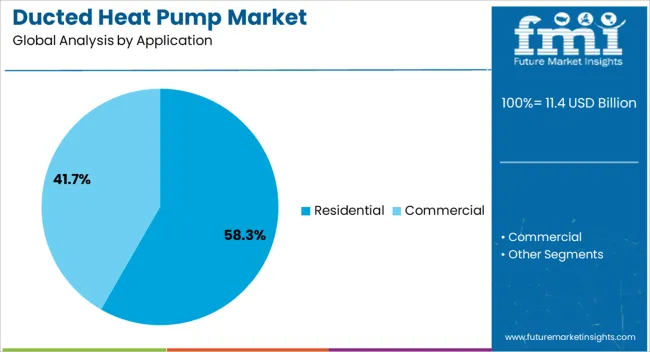
The residential segment is expected to account for 58.3% of the overall ducted heat pump market revenue in 2025, making it the leading application area. This strong position is being attributed to the rising adoption of whole-home heating and cooling systems in single-family and multi-family housing units.
Increased awareness about energy efficiency, combined with rising utility costs, has encouraged homeowners to invest in ducted heat pump systems that offer consistent indoor comfort with lower operating expenses. Government incentives and rebate programs aimed at promoting low-carbon heating technologies have accelerated the replacement of traditional HVAC systems in the residential sector.
Furthermore, the compatibility of ducted systems with smart thermostats and home automation platforms has increased their appeal among tech-savvy consumers. As housing markets continue to expand and building codes evolve to favor sustainable technologies, the residential segment is anticipated to remain the primary contributor to market growth.
The ducted heat pump market is driven by the rising demand for energy-efficient heating and cooling systems, with significant opportunities in residential and commercial construction. Emerging trends in smart climate control systems are reshaping the market, while high initial costs and installation complexity remain obstacles. By 2025, overcoming these challenges with cost-effective solutions and streamlined installations will be essential for continued market growth and wider adoption.
The ducted heat pump market is expanding due to the increasing demand for energy-efficient heating and cooling systems. Ducted heat pumps offer consistent temperature control while reducing energy consumption, making them an attractive option for residential and commercial spaces. As energy efficiency becomes a priority for consumers and businesses, the adoption of ducted heat pumps is expected to rise. By 2025, the market will continue to grow, driven by the shift towards more eco-friendly and cost-effective climate control solutions.
Opportunities in the ducted heat pump market are growing with the expansion of residential and commercial construction. The increasing need for energy-efficient HVAC systems in newly built properties is driving demand for ducted heat pumps. As building codes and regulations become more stringent, the integration of energy-efficient solutions like heat pumps in construction projects will be essential. By 2025, this market will benefit from the ongoing expansion of green building initiatives and the demand for cost-effective heating and cooling solutions.
Emerging trends in the ducted heat pump market include the integration of smart technology into climate control systems. Smart ducted heat pumps, which allow for remote temperature control, energy monitoring, and automatic adjustments, are gaining popularity. Consumers are increasingly seeking systems that provide enhanced convenience and energy savings. By 2025, the rise of connected home systems and automation will drive further adoption of smart ducted heat pumps, transforming how heating and cooling are managed in modern homes and businesses.
Despite growth, challenges such as high initial costs and installation complexity persist in the ducted heat pump market. The upfront cost of purchasing and installing a ducted heat pump system can be higher than traditional HVAC systems. Additionally, the installation process can be complex and requires skilled professionals. By 2025, addressing these challenges through more affordable pricing strategies and simplified installation techniques will be crucial for expanding the market and making ducted heat pumps more accessible to a wider range of consumers.
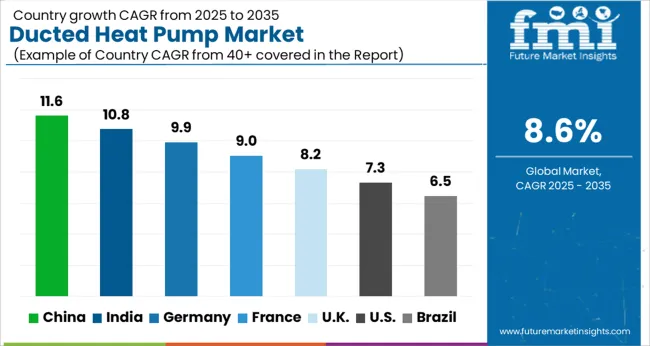
The global ducted heat pump market is projected to grow at an 8.6% CAGR from 2025 to 2035. China leads with a growth rate of 11.6%, followed by India at 10.8%, and Germany at 9.9%. The United Kingdom records a growth rate of 8.2%, while the United States shows the slowest growth at 7.3%. These varying growth rates are driven by factors such as the increasing demand for energy-efficient heating and cooling solutions, the growing focus on sustainability and environmental regulations, and rising adoption of renewable energy technologies. Emerging markets like China and India are experiencing higher growth due to rapid industrialization, urbanization, and increasing awareness of energy-saving solutions, while more mature markets like the USA and the UK see steady growth driven by technological advancements, energy efficiency standards, and government incentives for clean energy adoption. This report includes insights on 40+ countries; the top markets are shown here for reference.
The ducted heat pump market in China is growing rapidly, with a projected CAGR of 11.6%. China’s focus on reducing carbon emissions, increasing energy efficiency, and adopting renewable energy technologies is driving significant demand for ducted heat pumps. The country’s rapid urbanization, expanding residential and commercial infrastructure, and rising middle-class population contribute to the growing demand for efficient heating and cooling solutions. Additionally, government incentives for green energy solutions, combined with increasing investments in energy-efficient infrastructure, are further accelerating the adoption of ducted heat pump systems in China.
The ducted heat pump market in India is projected to grow at a CAGR of 10.8%. India’s increasing focus on energy efficiency, sustainability, and the demand for cost-effective heating and cooling solutions is fueling the growth of ducted heat pumps. The country’s expanding construction sector, rising disposable incomes, and urbanization are contributing to the growing demand for energy-efficient systems in both residential and commercial buildings. Additionally, the government’s push for renewable energy solutions and the rising adoption of eco-friendly technologies further accelerate market growth.
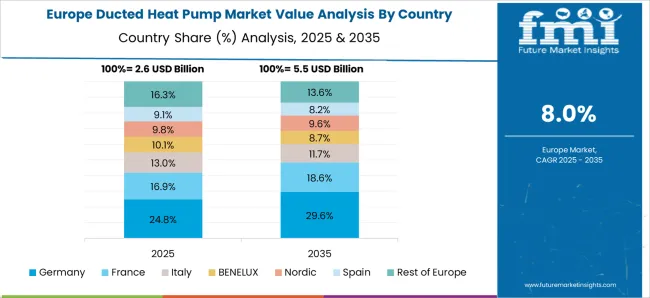
The ducted heat pump market in Germany is projected to grow at a CAGR of 9.9%. Germany’s strong commitment to sustainability, energy efficiency, and renewable energy adoption is driving steady demand for ducted heat pumps. The country’s focus on reducing carbon emissions, improving heating efficiency, and adhering to strict environmental regulations supports the market’s growth. Additionally, Germany’s robust building sector and the growing preference for energy-efficient solutions in both residential and commercial buildings contribute to the steady demand for ducted heat pumps.
The ducted heat pump market in the United Kingdom is projected to grow at a CAGR of 8.2%. The UK’s focus on reducing carbon emissions, achieving energy efficiency, and meeting sustainability goals is driving demand for ducted heat pumps. The country’s strong regulatory support for green energy solutions and the increasing adoption of energy-efficient heating and cooling systems in homes and businesses contribute to market growth. Additionally, the UK’s focus on achieving net-zero carbon emissions by 2050 is further accelerating the demand for energy-efficient and sustainable technologies such as ducted heat pumps.
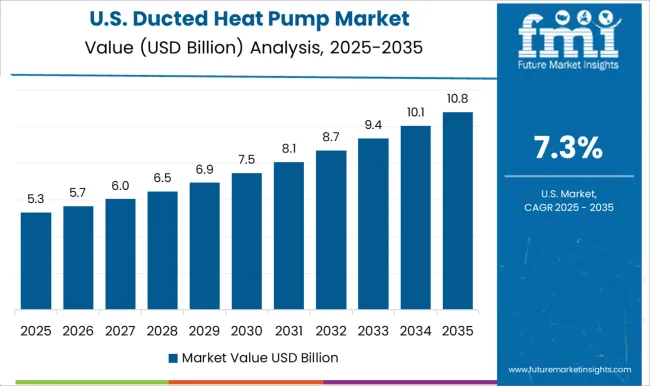
The ducted heat pump market in the United States is expected to grow at a CAGR of 7.3%. The USA market remains steady, driven by the increasing focus on energy-efficient heating and cooling systems and the growing demand for renewable energy solutions. The country’s commitment to sustainability, regulatory standards for energy efficiency, and rising consumer awareness of eco-friendly technologies are contributing to the market’s steady growth. Additionally, the growing adoption of smart home technologies and the increasing use of ducted heat pumps in residential and commercial sectors further support market expansion.
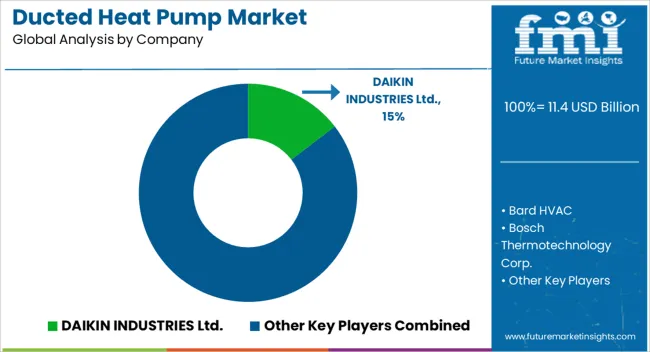
The ducted heat pump market is dominated by DAIKIN INDUSTRIES Ltd., which leads with its advanced ducted heat pump solutions that provide energy-efficient heating and cooling for residential and commercial applications. Daikin’s dominance is supported by its cutting-edge technology, global presence, and strong focus on sustainability and smart climate control solutions. Key players such as Bosch Thermotechnology Corp., Carrier, and Mitsubishi Electric Corporation maintain significant market shares by offering high-performance, energy-efficient ducted heat pumps that ensure optimal temperature regulation, reduce carbon emissions, and enhance comfort in various environments. These companies focus on delivering reliable and environmentally friendly HVAC systems with innovative features, such as inverter technology and smart home integration. Emerging players like Gree Electric Appliances, Inc., Trane, and Lennox International Inc. are expanding their market presence by providing specialized ducted heat pump systems for niche applications, such as industrial facilities, large residential properties, and energy-efficient commercial buildings. Their strategies include focusing on cost-effective solutions, improving system performance, and increasing the energy efficiency of their units. Market growth is driven by the increasing demand for energy-efficient heating and cooling solutions, government incentives for sustainable building technologies, and growing consumer interest in reducing energy consumption. Innovations in hybrid systems, IoT connectivity, and eco-friendly refrigerants are expected to continue shaping competitive dynamics and drive further growth in the global ducted heat pump market.
| Item | Value |
|---|---|
| Quantitative Units | USD 11.4 Billion |
| Application | Residential and Commercial |
| Regions Covered | North America, Europe, Asia-Pacific, Latin America, Middle East & Africa |
| Country Covered | United States, Canada, Germany, France, United Kingdom, China, Japan, India, Brazil, South Africa |
| Key Companies Profiled | DAIKIN INDUSTRIES Ltd., Bard HVAC, Bosch Thermotechnology Corp., Carrier, Colmac Industries, Glen Dimplex Group, Gree Electric Appliances, Inc., Johnson Controls, Lennox International Inc., LG Electronics, Lochinvar, Mitsubishi Electric Corporation, Rheem Manufacturing Company, SAMSUNG, and Trane |
| Additional Attributes | Dollar sales by heat pump type and application, demand dynamics across residential, commercial, and industrial sectors, regional trends in ducted heat pump adoption, innovation in energy-efficient and smart temperature control technologies, impact of regulatory standards on emissions and performance, and emerging use cases in green building systems and renewable energy integration. |
The global ducted heat pump market is estimated to be valued at USD 11.4 billion in 2025.
The market size for the ducted heat pump market is projected to reach USD 26.1 billion by 2035.
The ducted heat pump market is expected to grow at a 8.6% CAGR between 2025 and 2035.
The key product types in ducted heat pump market are residential, _single family, _multi family and commercial.
In terms of , segment to command 0.0% share in the ducted heat pump market in 2025.






Full Research Suite comprises of:
Market outlook & trends analysis
Interviews & case studies
Strategic recommendations
Vendor profiles & capabilities analysis
5-year forecasts
8 regions and 60+ country-level data splits
Market segment data splits
12 months of continuous data updates
DELIVERED AS:
PDF EXCEL ONLINE
Heat Detachable Tape Market Size and Share Forecast Outlook 2025 to 2035
Heat Induction Cap Liner Market Size and Share Forecast Outlook 2025 to 2035
Heat Transfer Film Market Size and Share Forecast Outlook 2025 to 2035
Heater-Cooler Devices Market Size and Share Forecast Outlook 2025 to 2035
Heat Sealing Equipment Market Size and Share Forecast Outlook 2025 to 2035
Heat Treating Market Size and Share Forecast Outlook 2025 to 2035
Heating Agents Market Size and Share Forecast Outlook 2025 to 2035
Heat Diffuser Market Size and Share Forecast Outlook 2025 to 2035
Heat-Activated Beauty Masks Market Analysis - Size, Share, and Forecast Outlook 2025 to 2035
Heat Exchanger Market Size and Share Forecast Outlook 2025 to 2035
Heat Sealable Packaging Market Size and Share Forecast Outlook 2025 to 2035
Heat Recovery System Generator Market Size and Share Forecast Outlook 2025 to 2035
Heat Shrink Tubes Market Size and Share Forecast Outlook 2025 to 2035
Heating and Cooling Market Size and Share Forecast Outlook 2025 to 2035
Heated Eyelash Curler Market Size and Share Forecast Outlook 2025 to 2035
Heat Sealing Machine Market Size and Share Forecast Outlook 2025 to 2035
Heated Jacket Market Trends & Demand 2025 to 2035
Heat Sealing Tape Market Size and Share Forecast Outlook 2025 to 2035
Heat Therapy Units Market Analysis - Size, Share, and Forecast 2025 to 2035
Heat Moisture Exchanger Market Size and Share Forecast Outlook 2025 to 2035

Thank you!
You will receive an email from our Business Development Manager. Please be sure to check your SPAM/JUNK folder too.
Chat With
MaRIA